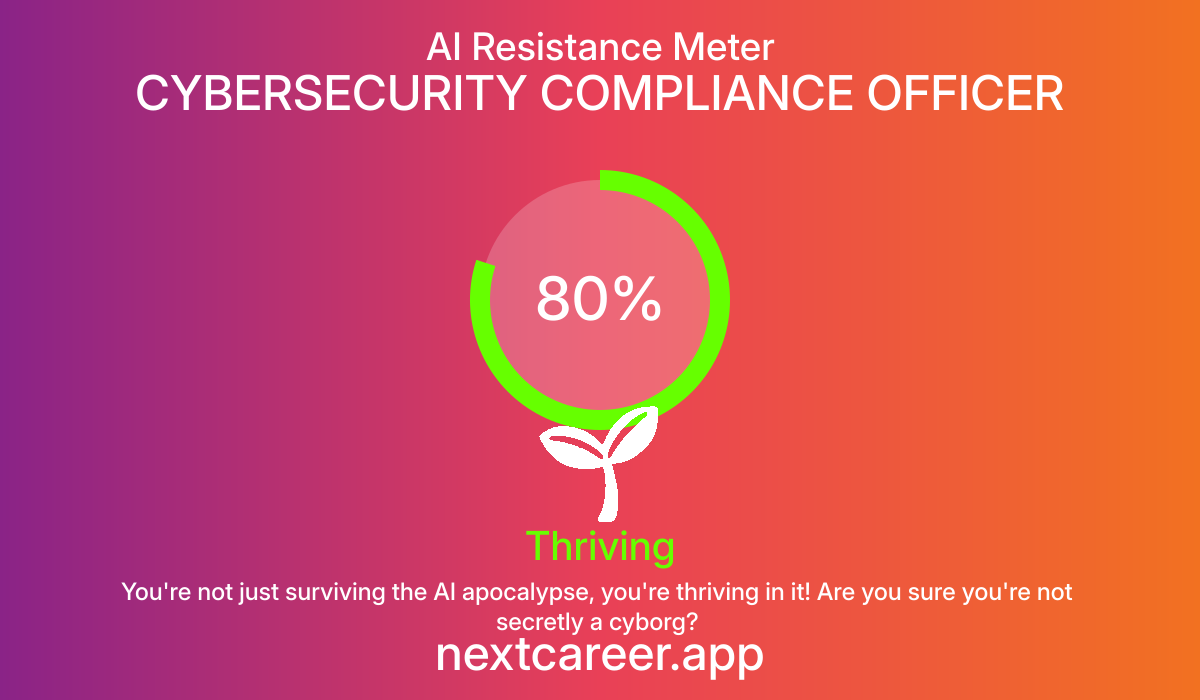AI Resistance Analysis
CYBERSECURITY COMPLIANCE OFFICER
CYBERSECURITY COMPLIANCE OFFICER
AI Resistance Score
AI Resistance Meter
Thriving
CYBERSECURITY COMPLIANCE OFFICER
You're not just surviving the AI apocalypse, you're thriving in it! Are you sure you're not secretly a cyborg?
The role of a Cybersecurity Compliance Officer is crucial in ensuring that organizations adhere to various regulatory frameworks and compliance standards related to data protection and cybersecurity. This role requires a high degree of cognitive skills, emotional intelligence, and an understanding of complex regulations, making it less susceptible to AI replacement in the near term and maintaining a strong resistance in the long term.
The role of a Cybersecurity Compliance Officer is crucial in ensuring that organizations adhere to various regulatory frameworks and compliance standards related to data protection and cybersecurity. This role requires a high degree of cognitive skills, emotional intelligence, and an understanding of complex regulations, making it less susceptible to AI replacement in the near term and maintaining a strong resistance in the long term.
Key Factors
- Cognitive Tasks: The role relies heavily on complex decision-making, critical thinking, and interpretation of laws and regulations, which AI can assist with but cannot fully replicate.
- Emotional Intelligence: This role necessitates interaction with various stakeholders within an organization, requiring negotiation, communication skills, and conflict resolution.
- Physical Skills: The role involves predominantly desk-based work with little to no physical tasks, thus it has a neutral impact from physical skills.
- Creative Thinking: The ability to develop innovative compliance strategies and respond to emergent threats requires a level of creativity that AI lacks.
Human Advantages
- Unique understanding and interpretation of specific organizational contexts and culture.
- Ability to build trust and relationships with stakeholders across different teams.
- Capability to manage nuanced ethical and compliance decisions that require human judgment.
AI Vulnerabilities
- AI can assist in monitoring security compliance using automated tools, potentially reducing some audit and reporting tasks.
- AI may analyze compliance data more quickly and efficiently, which could diminish the need for some analytical roles.
Recommended Actions
- Invest in continuous education on emerging technologies and regulatory frameworks to stay ahead in the field.
- Develop skills in AI governance and ethics to complement the technological changes in compliance needs.
- Foster collaboration with AI tools, using them to enhance efficiency in monitoring and compliance assessments rather than replacing the human role.
- Engage in cross-disciplinary training, incorporating cybersecurity knowledge with legal and ethical standards to elevate the role's importance in the organization.
In the near term, the increasing complexity of regulations and the importance of cyber compliance will require human oversight and expertise. Additionally, emerging technologies, such as quantum computing, will necessitate new compliance frameworks that humans will need to navigate. In the long term, as AI tools become more integrated, the role may evolve to focus more on governance, strategy, and human oversight of AI compliance technologies rather than routine tasks, emphasizing collaboration with AI rather than replacement.

Why Calculate AI Resistance?
Understanding how AI-resistant your career is becoming increasingly important in today's rapidly evolving job market. Our analysis combines multiple factors including required human skills, technological adaptability, and future industry projections to give you a comprehensive view of your career's sustainability.